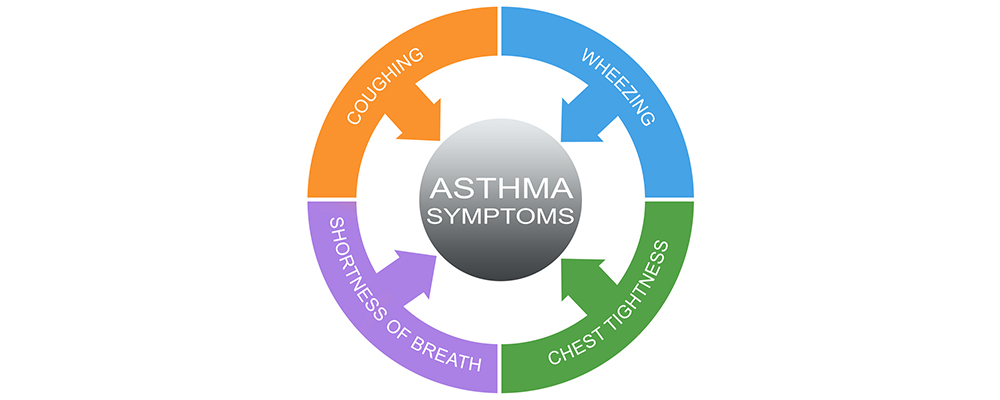Updated on June 22, 2022
Overview
Allergies and asthma are two very different disorders. However, you may notice that they are frequently brought up together. Here’s a good explanation for this symbiotic relationship.
Allergens that induce sneezing, fits, and watery eyes in some persons can also trigger an asthma attack in others. Allergic asthma is the most frequent type of asthma happening around the world. Approximately 90% of children with asthma have allergies, compared to about 50% of adults with asthma. Allergic asthma symptoms appear after inhaling allergens (or allergy triggers) such as pollen, dust mites, or mold. When you exercise in cold air or breathe smoke, dust, or fumes, your asthma (allergic or non-allergic) usually gets worse. A strong odor might sometimes trigger it too. Many Clinical Research Organizations in Michigan are conducting Clinical Trials to understand this condition and how allergens work in inducing an attack.
Because allergens can be almost anywhere, it’s critical for persons with allergic asthma to understand their triggers and how to avoid an attack. This blog answers questions such as “Is Asthma genetic?” or “Does asthma go away?”
Pathophysiology of Asthma: What is Asthma?
Asthma is a condition that causes your airways to restrict, swell, and produce excessive mucus. This can make breathing difficult, leading to coughing, whistling (wheezing) on exhale, and shortness of breath. The pathophysiology of asthma is very complex, including airway inflammation, intermittent airflow restriction, and bronchial hyperresponsiveness.
This may be a minor irritation to some. However, others may have a major problem that makes it difficult for them to go about their everyday lives and may even result in a life-threatening asthma attack. Asthma is an incurable condition, but its symptoms are manageable. Because asthma symptoms might change over time, it’s crucial to keep track of them with your doctor and adjust your therapy as needed
What is Allergic Asthma?
Allergies play a significant role in the lives of many people. Allergies can have an impact on what you eat, what products you use, and even how you breathe. Allergic asthma is a breathing disorder that occurs when allergens are combined with asthma. Allergic asthma is a type of asthma in which your airways constrict when you inhale an allergen. Pollen, dander, or mold spores in the air can be a cause for all of this. Allergens are also known as triggers since they cause your asthma to flare up.
Both children and adults suffer from this type of asthma. Shortness of breath, coughing, wheezing, nasal congestion, itchy eyes, and skin reactions are all symptoms of allergic asthma. Asthma of this type is the most frequent. It is believed that asthma affects around 25 million people in the United States. Approximately 60% of that group suffers from asthma brought on by allergies. If you have questions such as “Does asthma go away?”, consider reducing your exposure to these allergens or triggers.
What are the triggers?
Allergens can be present in almost any environment. These can form in both indoor and outdoor places. Inhaling certain allergens can trigger your symptoms if you have allergic asthma. It’s critical to understand what triggers your asthma so you can better manage your condition. Understanding the pathophysiology of Asthma can also go a long way in helping us learn how the triggers can cause an asthma attack.
Because allergens can be almost anywhere, it’s critical for persons with allergic asthma to understand their triggers and how to avoid an attack. Some common triggers are:
- Airborne allergens include pollen, dust mites, mold spores, pet dander, and cockroach waste particles.
- Respiratory Infections, such as the common cold
- Physical activity or exertion
- Cold air
- Smoke and other air pollutants and irritants
- Beta-blockers, aspirin, and nonsteroidal anti-inflammatory drugs including ibuprofen (Advil, Motrin IB, and others) as well as naproxen sodium (Aleve)
- Stress and strong emotions
- Sulfites and preservatives are in some foods and beverages, including shrimp, dried fruit, processed potatoes, beer, and wine.
- GERD (gastroesophageal reflux disease) causes stomach acids back up into your throat
Is Asthma Genetic?
For a long time, this remained a question: is asthma genetic? Through research, it came to the idea that allergic asthma is a combination of hereditary and environmental factors. In the development of asthma, genetics often plays a significant influence. Having an asthmatic or allergic family member increases the likelihood of developing asthma. As a result, it’s critical to know your family’s medical history.
Allergic Asthma Risk Factors:
A variety of asthma risk factors acquire allergic asthma.
- Someone in the family already suffering from asthma, such as a parent or sibling
- Atopic dermatitis or hay fever.
- Obesity
- Smoking
- Exposure to secondhand smoke
- Occupational triggers, such as chemicals used in farming, hairdressing, and manufacturing, are exposure to exhaust fumes or other types of pollution.
Allergic Asthma Symptoms:
Asthma symptoms differ from one person to another. You may only experience symptoms at certain times of the day — such as when exercising — or experience symptoms all of the time.
Following are some of the symptoms of asthma:
- Breathing problems
- Tightness or pain in the chest
- Wheezing on exhalation is a typical symptom of asthma in children.
- Shortness of breath and coughing might make it difficult to sleep.
- Coughing or wheezing attacks aggravated by a respiratory virus with flu and cold
The symptoms can be very intense during an asthma attack. It is better to have a treatment plan already available in case you have severe asthma symptoms — this plan usually includes an inhaler (sometimes referred to as a rescue inhaler).
Some people’s asthma symptoms worsen in the following situations:
- Exercise-induced asthma may be exacerbated by cold and dry air.
- Occupational asthma is caused by irritants in the job such as chemical fumes, gasses, or dust.
- Allergy-induced asthma is caused by airborne allergens such as pollen, mold spores, cockroach feces, or skin and dried saliva shed by dogs (pet dander)
You may also experience symptoms more related to allergies. These are normally less intense than usual asthma symptoms and can occur only when you’re exposed to an allergen. These symptoms can include:
- A runny nose,
- Itchy eyes,
- Sneezing, and
- Skin reactions.
Complications caused by Allergic Asthma:
Complications of asthma include:
- Symptoms and signs that disrupt sleep, work, and other activities
- Sick days from school/work due to asthma attacks
- A permanent narrowing of the tubes that transport air to and from your lungs (bronchial tubes), affects your ability to breathe.
- Hospitalizations and emergency department visits for severe asthma attacks
- Long-term use of several drugs intended to stabilize severe asthma has side effects.
Allergic asthma can have catastrophic consequences. Anaphylaxis is one such consequence. Symptoms of this sort of acute allergic reaction include:
- Hives
- swelling of the mouth or face
- Difficulty in swallowing
- Anxiety
- Cough
- Diarrhea
- Fainting
- Nasal congestion
- unclear speech
Anaphylaxis can be fatal if left untreated. It can lead to health problems such as an irregular heart rate, weakness, low blood pressure, cardiac arrest, and pulmonary arrest.
When to Contact your Doctor?
If you believe you have asthma or if think you might have a family history of asthma, “Is asthma genetic?”, consult your doctor if you experience regular coughing or wheezing that lasts more than a few days, or if you have any other signs or symptoms of asthma. Early treatment of asthma may help avoid long-term lung damage and keep the condition from worsening over time.
To monitor your asthma after it has been diagnosed. Consult with your doctor to keep it under control. Long-term control improves your day-to-day living and can avoid a life-threatening asthma attack.
If your asthma attacks worsen. If your medication isn’t easing your symptoms or if you need to use your quick-relief inhaler more frequently, consult your doctor straight away.
Do not take more medication than is prescribed without first visiting your doctor. Overuse of asthma medications might produce negative effects and worsen your asthma.
To go over your treatment plan. Asthma frequently evolves over time. Consult your doctor on a frequent basis to discuss your symptoms and make any necessary treatment adjustments.
Does Allergic Asthma go away?
People suffering from this condition might be in question: does asthma go away? How can they manage the asthma risk factors?
But your doctor may prescribe a variety of medications to help manage your asthma. These include one or more of the following:
- a quick-acting medication (such as short-acting beta-agonists or anticholinergics), which treats asthma symptoms as they occur and may be the only medication required if you have intermittent symptoms
- A quick-acting medication (such as short-acting beta-agonists or anticholinergics), which treats asthma symptoms as they occur and may be the only medication required if you have intermittent symptoms
- Oral or injectable anti-inflammatory drugs (such as oral corticosteroids, leukotriene modifiers, or biologics) are used to help avoid and treat more severe asthma symptoms, and they may also help manage allergy symptoms.
Allergy treatment may involve the following, depending on the severity of your symptoms:
- antihistamines, which can aid in the treatment of basic allergy symptoms such as itching
- Allergy shots (immunotherapy), help your body become less sensitive to particular allergens and may be necessary if your symptoms are more severe.
What are the Preventive Measures?
While asthma cannot be avoided, identifying your triggers and regulating your surroundings can help you lower your risk of an allergic asthma attack. Here are some home remedies for asthma attacks without inhalers for obtaining relief:
- When pollen counts are high, stay inside. Close the windows if possible. Use an air conditioner with a clean air filter if it’s hot outside. If the air conditioner smells musty or moldy, don’t use it. Use a dehumidifier instead of an evaporative chiller (also known as a swamp cooler).
- Avoid dust mites. Fabrics and carpets are home to these microscopic creatures. Wrap allergen-proof covers around your pillows, mattress, and box spring. Once a week, wash your sheets and other linens in hot water. If at all possible, remove the carpeting off the walls. Remove areas where dust can collect, such as heavy draperies, upholstered furniture, and clothing heaps. Only buy washable stuffed animals if your child suffers from allergic asthma.
- Control the humidity in your home. Check with a low-cost meter. Use a dehumidifier or air conditioner if your home has more than 40% moisture. This will dry up the air and prevent mold, cockroaches, and house dust mites from growing. Any plumbing or roof leaks should be repaired by a professional.
- Check for allergies to pets. Whether you have pets, have them tested to see if they’re the source of your issue. If you can, keep them outside or find them a new home. At the very least, keep all pets out of your room. High levels of cat allergies can linger in a home or apartment for months after cats are no longer present.
- Cats as well as dogs that are hypoallergenic do not exist. You can wash your pet once a week if you like, but it won’t make a big difference in the quantity of allergen you inhale. Pet allergen-reducing dust or sprays have not been proven to be helpful.
More Preventive Measeures:
To avoid mold and insects, keep your kitchen and bathroom clean and dry. Contact a pest control service if you’re allergic to cockroaches and notice signs of them in your home. Insect repellent won’t work. You must eliminate all food sources in your home, including crumbs on the carpet and oil spots near the stove. Turn on the exhaust fan when cooking or taking a shower to reduce humidity in the room.
- Choose your air filters carefully. Large HEPA room air filters remove smoke and other small particles (such as pollen), only when the fan is turned on. They have no effect on humidity and dust mites.
- Be mindful of outdoor activities. Pollens and molds can be stimulated by gardening and raking. When outside, wear a HEPA filter mask to limit the quantity of pollen and mold particles that affect your lungs.
Bottom line:
Allergy-induced asthma (also known as allergic asthma) is a chronic inflammatory illness in which your airways contract when you inhale an allergen. The immune system produces too much IgE when exposed to allergens such as pollen, mold, dust mites, or pet dander. The airways swell as a result of this. Symptoms such as wheezing and shortness of breath are possible.
A skin prick test and lung function testing are particularly suitable for diagnosis. Allergic asthma treatment includes avoiding recognized asthma risk factors, as well as using medications to manage symptoms, and following certain home remedies for asthma attacks without inhalers. Immunotherapy to raise your tolerance to certain allergens may also be recommended by your doctor. Many pharmaceutical and Clinical Research organizations as conducting paid Asthma Clinical Trials in Michigan to help people through this debilitating condition and find a solution to it.









